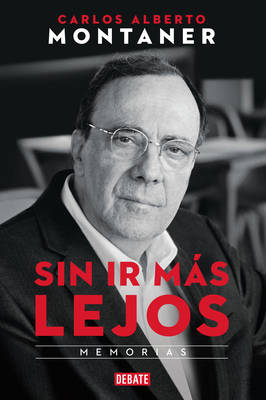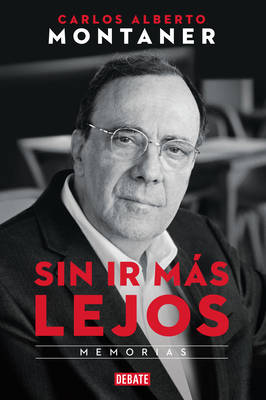
Bedankt voor het vertrouwen het afgelopen jaar! Om jou te bedanken bieden we GRATIS verzending (in België) aan op alles gedurende de hele maand januari.
- Afhalen na 1 uur in een winkel met voorraad
- In januari gratis thuislevering in België
- Ruim aanbod met 7 miljoen producten
Bedankt voor het vertrouwen het afgelopen jaar! Om jou te bedanken bieden we GRATIS verzending (in België) aan op alles gedurende de hele maand januari.
- Afhalen na 1 uur in een winkel met voorraad
- In januari gratis thuislevering in België
- Ruim aanbod met 7 miljoen producten
Zoeken
€ 29,95
+ 59 punten
Omschrijving
"Llegó la hora de recapitular. Hay que ir haciendo las maletas. Desaparecer es una actividad ingrata que solo se justifica porque es la única prueba irrefutable de que hemos vivido". Las anticipadas memorias del escritor y periodista cubano Carlos Alberto Montaner hablan de cuanto él ha visto y oído, de lo que ha creído y lo que recuerda. Aunque, y el autor lo advierte con antelación, entretejidos en esos recuerdos puede haber algunos pasajes involuntariamente forjados por la imaginación de un escritor que también cultiva con éxito la ficción. En estas páginas, Montaner escribe sobre la Revolución cubana, un proceso que conmocionó su adolescencia y cuyo derrotero moldearía su vida desde entonces, aun en el exilio. Acto seguido, recuenta el peregrinaje que comenzó a los dieciocho años y que ha durado las cuatro quintas partes de su vida, marcado por ese anhelo intenso de ver a Cuba libre que ha propulsado toda su obra. "... no recuerdo un solo día en el que esa isla no hubiera estado presente en mí de alguna forma. Siempre ha existido una llamada, una noticia, un visitante, un artículo, un libro, una entrevista, una firma colectiva, una conversación, algo que me obligaba a recordar mi condición de exiliado y me retrotraía al centro del conflicto". Íntimo, ameno y revelador, Sin ir más lejos no es solo la vida de Carlos Alberto Montaner y su familia cercana, es también la historia de Cuba y de la diáspora cubana. ENGLISH DESCRIPTION "Let's recap. Get packing. Disappearing is a thankless activity that is only justified because it is the only irrefutable proof that we have lived." In this book, Cuban writer and journalist Carlos Alberto Montaner talks about all that he has seen and heard, believed and remembered, but he warns that there may be some passages that were unwittingly invented: "sometimes, even, dreams mix with reality and it is difficult to know where one ends and the other begins. Memories are not historical studies but the reflection of perceptions, and those inevitably blur or transform over time." With these memories, which he decided to start writing in 2015, Montaner talks about the Cuban Revolution, which happened during his adolescence and forever shaped his life. He continues with his years in exile, which started when he was 18 and took him from Miami to Puerto Rico, then to Spain and again to Miami, always with one foot on a plane. "I will use these memories to dabble in historical and political judgment." Despite having lived outside of Cuba for 80% of his life, Montaner warns that "I don't remember a single day in which that island wasn't present in me in some way. There has always been a call, a piece of news, a visitor, an article, a book, an interview, a joint venture, a conversation, something that requires me to remember my condition as an exile and takes me back to the center of the conflict."
Specificaties
Betrokkenen
- Auteur(s):
- Uitgeverij:
Inhoud
- Aantal bladzijden:
- 400
- Taal:
- Spaans
Eigenschappen
- Productcode (EAN):
- 9781644730676
- Verschijningsdatum:
- 22/10/2019
- Uitvoering:
- Paperback
- Formaat:
- Trade paperback (VS)
- Afmetingen:
- 152 mm x 226 mm
- Gewicht:
- 521 g

Alleen bij Standaard Boekhandel
+ 59 punten op je klantenkaart van Standaard Boekhandel
Beoordelingen
We publiceren alleen reviews die voldoen aan de voorwaarden voor reviews. Bekijk onze voorwaarden voor reviews.









